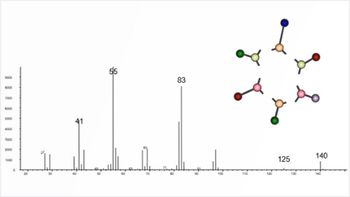
Advancing Mass Spectrometry: Exploring the Breakthrough Orbitrap Astral Mass Spectrometer with Dr. Aaron Robitaille
In this interview, we explore the significance of this groundbreaking technology and its impact on mass spectrometry with Aaron Robitaille, Director of Marketing for Mass Spectrometry at Thermo Fisher Scientific in San Jose, California.
Welcome to this exclusive interview with Aaron Robitaille, Director of Marketing for Mass Spectrometry at Thermo Fisher Scientific in San Jose, California. Robitaille is an expert in mass spectrometry and has played an important role in the development of the Thermo Scientific™ Orbitrap™ Astral™ mass spectrometer (MS). In this interview, we explore the significance of this groundbreaking technology and its impact on mass spectrometry. The Orbitrap Astral MS offers exceptional capabilities, enabling scientists to analyze samples at an impressive speed and depth. With faster throughput and higher coverage, it allows for deeper proteome analysis while maintaining accurate quantitation. Moreover, its improved sensitivity for single-cell analysis has opened new avenues for studying protein abundances. The combination of the Astral analyzer and the trusted Orbitrap analyzer ensures superior quantitative performance. This instrument holds great potential for protein discovery and precision medicine, offering researchers the ability to study proteomics and metabolomics cohorts on a larger scale, leading to accelerated breakthroughs in various fields, from cardiovascular disease to cancer.
What is the significance of the Orbitrap Astral mass spectrometer in the field of mass spectrometry?
The Orbitrap Astral mass spectrometer is a groundbreaking technology that enables scientists to analyze samples with up to 4x faster throughput than previous technologies, while at the same time enabling them to dig deeper into the proteome with up to 2x higher coverage. This MS system has improved sensitivity for single cells, and all with accurate and precise quantitation to measure biologically meaningful differences in protein abundances. Customers want to measure lower, abundant proteins like transcription factors or cytokines, as well as analyze samples with less starting materials such as biopsies for clinical research applications—all with highly accurate and precise quantitation—which allows them to detect and measure biologically significant sample differences. For example, users want to be able to quantify the protein abundance differences between a healthy and disease condition, or a drug-treated verses control, so that they can identify what are those significant differences in a biomarker discovery experiment. And now they can do this all faster, easier, and with higher sensitivity.
What technology does Thermo Fisher utilize in the Orbitrap Astral mass spectrometer to achieve deeper proteome coverage and increased throughput?
The Orbitrap Astral MS has two analyzers, and what's new about this technology is the Astral analyzer, which is an abbreviation for Asymmetric Track Lossless (Astral) analyzer. What is really unique is the lossless ion transmission, which means we can detect 80% or more of the ions that enter the mass analyzer, compared to only 1-5% for other technologies. This enables both higher sensitivity for application like single cell proteomics, but also that when scanning fast at 200 Hz, the instrument can collect meaningful information on each scan.This is in contrast to other technologies which traditionally have to average scans together—while they can scan very quickly—they don't get the same quality of information.
How does the Astral analyzer's quantitative performance compare to the gold standard Thermo Scientific Orbitrap mass spectrometers in high-resolution quantitative proteomics?
The advantage of the Orbitrap Astral MS is that it combines two mass analyzers together, the new Astral analyzer with high sensitivity and fast speed, plus the gold standard high dynamic range Orbitrap (orbital trap MS) analyzer. This means that customers do not have to compromise on quantitation, as both analyzers run in parallel, thus delivering the high sensitivity and fast scan rate for the Astral analyzer, with the proven and trusted high dynamic range of the Orbitrap analyzer. Data is collected both on a high resolution, accurate mass MS1 (full scan) in the Orbitrap analyzer, while at the same time collecting high sensitivity MS2 scans in the Astral analyzer. Fundamentally, this means that users get to see more of the proteome with the same proven quantitation precision and accuracy that they've come to know and expect with the Orbitrap technology.
What potential impact does the Orbitrap Astral mass spectrometer have on protein discovery and precision medicine?
This new technology accelerates possibilities, particularly around precision medicine. The biggest benefit for protein discovery and precision medicine is that scientists can now enable the study of proteomics and metabolomics cohorts at a high scale previously only obtainable by the genomics-type approaches. Previously scientists had to make a compromise between digging deeper “or” having higher throughput. With the Orbitrap Astral MS, this is now an “and” statement, enabling scientists to see more information in less time.
Can you explain how the Orbitrap Astral mass spectrometer addresses the challenge of limited time when studying the human proteome?
The Orbitrap Astral MS can achieve up to 180 samples per day (SPD) with standard chromatography separation conditions. But if we use new innovations on the liquid chromatography (LC) separation, like the Thermo Scientific µPAC™ Neo High Throughput high performance liquid chromatography (HPLC) columns, which are an ordered array structure etched from silicon wafers, rather than a packed bead format, we can push this limit even higher to more than 300 SPD— previously sample throughput for conventional MS systems was approximately 24 samples per day. So even now with our very high sample throughput, we are able to deliver better statistical power and more biologically meaningful insights across precision medicine efforts.
How were software algorithms optimized to handle the analysis of large cohorts efficiently?
As you can imagine, once you increase your sample throughput to over 300 samples per day, the mass spectrometer itself is no longer the rate limiting step in a sample to knowledge workflow. With this in mind for the Orbitrap Astral MS, we created the Thermo Scientific Ardia™ Advanced tower server and Thermo Scientific Proteome Discoverer™ software solutions that both automates data transfer and processing, but also does so while maintaining study design, so that sample information for both raw files and data processing are contained and backed-up securely together, accelerating insights while also improving productivity. Previously customers would have to take a USB stick or a hard drive to manually transfer the raw data over, and then analyze it. Now we have a streamlined solution that automates data processing in a secure and organized way with all the study information in one location, so customers get their raw information, their processed results, and their interpretation of those results—all organized and saved by a study—with an archival tool that enables them to have a working space to get meaningful insights faster. All that information can then be available to share with the larger scientific community as scientists collaborate on research and publish their results.
What excites you and Thermo Fisher Scientific the most about the Orbitrap Astral mass spectrometer?
The Orbitrap Astral MS is the start of a bright future, and it is really about what our customers do with this new technology to push science and precision medicine forward. End-users will use this new system with their own application specific knowledge to achieve greater insights faster. We look forward to helping our customers achieve this bright future in research to identify new clinical biomarkers, reveal diseases earlier and develop new interventions for everything from cardiovascular disease to cancer using this groundbreaking instrument.
In conclusion, the interview with Dr. Aaron Robitaille has shed light on the trailblazing Thermo Scientific Orbitrap Astral mass spectrometer and its potential significant impact on mass spectrometry. This cutting-edge technology allows for faster sample analysis, deeper proteome coverage, and improved sensitivity for single-cell studies. By combining the Astral and Orbitrap analyzers, the instrument ensures accurate quantitation and high-resolution quantitative proteomics. The Orbitrap Astral MS has the potential to revolutionize protein discovery and precision medicine by enabling large-scale studies and faster insights. With its ability to handle high sample volumes and advanced software solutions, researchers can uncover new insights and make breakthrough discoveries across a wide range of disciplines, ultimately advancing our understanding of complex diseases and paving the way for precision medicine solutions.
Newsletter
Join the global community of analytical scientists who trust LCGC for insights on the latest techniques, trends, and expert solutions in chromatography.




